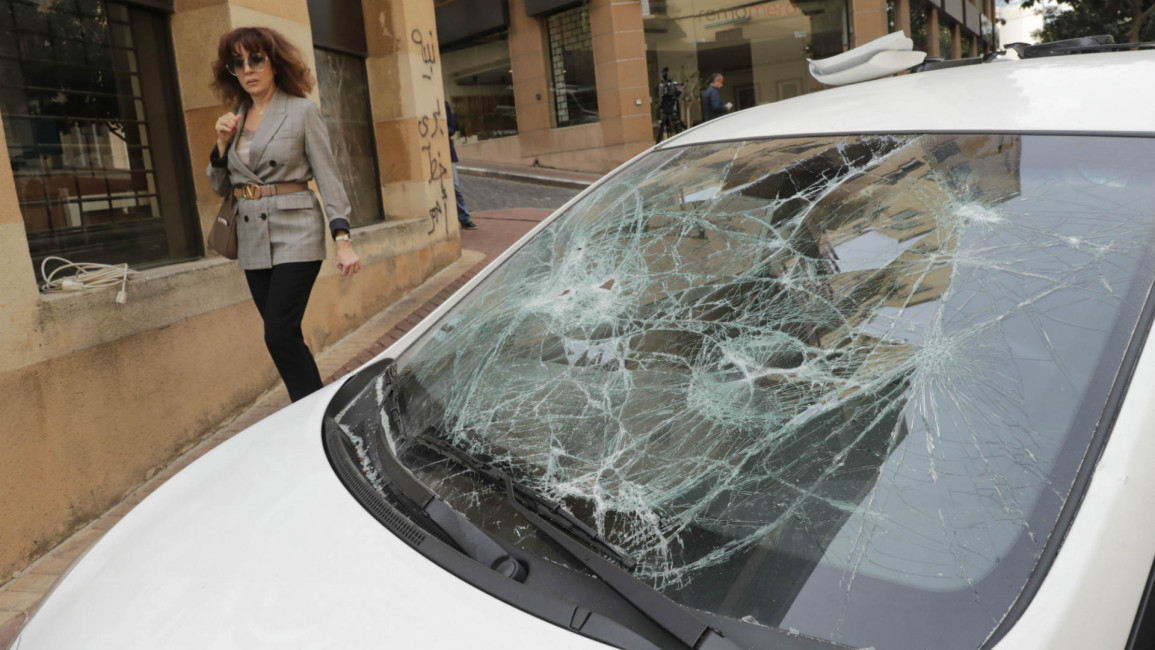'Hezbollah stole my phone': Lebanon's protesters regroup after attacks
It followed an attack on key demonstration sites in Beirut on Sunday night by counter-protesters, injuring several people and damaging dozens of cars.
Despite protesters' efforts, security forces cleared most of the road blocks across the country, with turnout lower than expected due to the overnight attacks on Beirut's main protest site by supporters of the main Shia groups Hezbollah and Amal.
In a first since the start of the protests, which have been met with frequent bouts of pro-government violence, Lebanon's judiciary opened an investigation into Sunday night's clashes, in which counter-protesters attacked others with rocks and set cars on fire.
Video footage was circulated on social media of TV presented Dima Sadek, whose unlocked phone was snatched from her hand by a counter-protest attacker.
"Hezbollah stole my phone!" she shouts in the clips, adding that her phone being unlocked meant the thugs could see her messages, contacts, and sources from her coverage on the protest movement, which has been going on for 40 days.
Twitter Post
|
A campaign of intimidation by Hezbollah and Amal supporters has plagued the anti-government demonstrations.
On several occasions, groups of plain clothed men, sometimes riding motorbikes, have stormed rallies in Beirut and southern Lebanon.
Twitter Post
|
Videos from Sunday showed them also heckling Sadek, calling her a prostitute before snatching her phone.
Photos and videos of a number of cars which had been set ablaze by the counter-protesters on Sunday night also did rounds on social media.
Other clips showed them shouting "Shia! Shia!" and threatening to kill those who criticise Hassan Nasrallah, the leader of Hezbollah.
Senior British official urges government formation
In another development signalling the seriousness of the country's political crisis, senior British diplomat Richard Moore visited Beirut on Monday, meeting with President Michel Aoun, caretaker Prime Minister Saad Hariri, caretaker Foreign Minister Gebran Bassil and Parliament Speaker Nabih Berri.
Moore, the director general for political affairs at the UK Foreign and Commonwealth Office, urged the formation of a new government as well as pushing forward policies in line with the people's demands.
"The matter of choosing leaders and a cabinet is a domestic issue for the Lebanese. The people of Lebanon have been clear in their demand for improved governance, and they should be heard," Moore said.
Political leaders have failed to select a new government nearly one month since Prime Minister Saad Hariri's cabinet resigned, bowing to popular pressure.
Read more: Nobody knows Lebanon's problems better than its women. It's time you started listening
President Michel Aoun, whose powers include initiating parliamentary consultations to appoint a new premier, said he was open to a government that would include technocrats and representatives of the popular movement -- both key demands of the protesters.
But demonstrators say they reject any government that would also include representatives of established political parties.
The US, France, the World Bank, and credit rating agencies have all urged officials to accelerate cabinet formation, warning of a deteriorating economic and political crisis.



